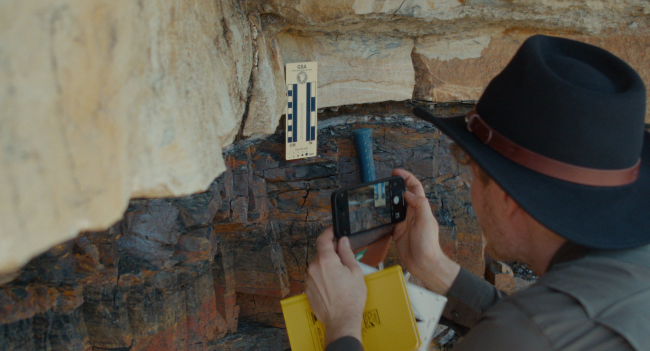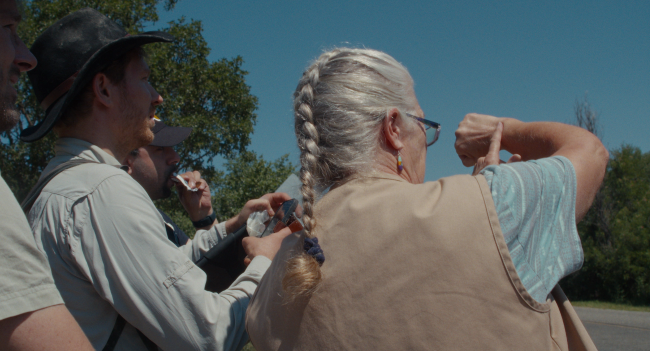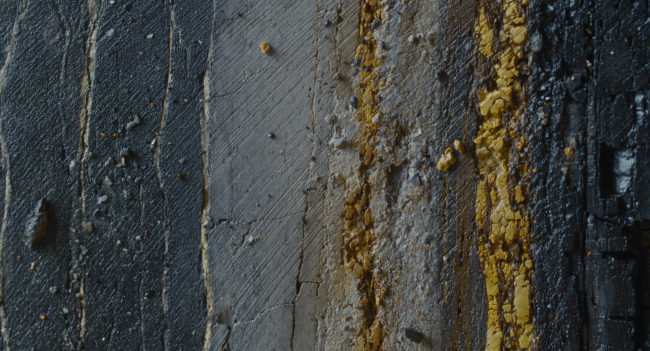Mythical like a dragon, but also real, we grew attached to ideas of what a dinosaur could have been. A gentle touch in a clay layer uncovers fossilised bones, the physical remains of what is left of the creatures that spark our imaginations are met with tenderness. ‘You don’t love me, you love the idea of me’, says the t-rex.
A team of VUB researchers set out to find definite proof of what caused the end of the dinosaur era. One fine line in the rockbed holds knowledge to the minute, of that fateful day, 66 million years ago. This is not an impossible love story, it’s a true crime, set in deep time.
Frederik & Maria Stuut are brother and sister from Utrecht, the Netherlands. Currently located in Brussels, Frederik just finished his Master’s in ‘Audio-Visual Arts: Film’, and Maria, after having finished her bachelor’s in ‘Liberal Arts and Sciences’, is finishing her master’s in ‘Fine Arts’. At a young age they started making videos together with a DV-camera of their father, of which in more recent years they used old footage for their first short documentary; Vorgestern oder übermorgen, a film about their grandfather with Alzheimer’s. Frederik’s background in film and Maria’s in fine art result in a distinctive hybrid style that combines cinematic and experimental approaches. Their second project Ebb is an atmospheric coming of age film that hovers between documentary, fiction, and experimental film. Their third short documentary Seagulls Scream on the Weekend won ‘Best documentary’ at Leuven Short Film Festival 2023 and was selected for numerous international festivals.
Maria’s artistic practice is closely entangled with her scientific background. She graduated her major in biology with research on crocodiles, for which she spent three months tracking the Philippine crocodile. She felt like she could see into a deep past when looking at a crocodile - like looking at a dinosaur. Her work often has ecological stories that connect us to space, or timescales from other beings or entities. She performs with a microscope and a microorganism that can become infinitely old, she sings poetry about cabbage, a melancholic cauliflower, and she lays still in the wind on the beach for hours, in an effort to become a dune. Working with different disciplines, you can find her work presented at a theaterfestival, an art expo, a punk music venue, or a film festival.
At 6 years old, while trekking through the Dolomites, Frederik used his father’s DV camera to recreate scenes from The Lord of The Rings. The fellowship in his case were his parents, sister and grandfather. Twenty years later, he is still making films. During his time in film school he developed an interest in a hybrid approach to filmmaking, alternating hyper naturalism with very stylized elements, blending between these worlds.
After the impact of the meteor, dust spread throughout the atmosphere in a matter of days, blocking all direct sunlight. The last days of the dinosaurs were dark, and cold. ‘The dust that sealed the t-rex fate’ (research paper by VUB scientists Cem Berk Senel, Pim Kaskes, Johan Vellekoop) is both fascinating research that can teach us about the extinction process of intriguing creatures after the famous meteor impact, as well as an invitation to think on themes such as deep time, extinction and climate change. As a biologist, Maria is often interested in human attempts to imagine the perspectives of other beings, whilst being aware that this perspective can never be reached. The beauty for her lies in the attempt- an attempt that can never fully succeed.
We will, for example, never know what it is like to be a bat (after philosopher Thomas Nagel). The meticulous research that goes behind reconstructing the extinction event is already fascinating in itself, but it can also read as labor of love, an unrequited love for a creature we will never meet (and if we could, would likely kill us, depending on the species of course). In this film we would like to combine the hard science with a sense of yearning, humour, absurdism and melancholy. When connecting science and art we strongly resonate with Timothy Morton’s slogan: 'Thinking should know how to laugh and cry'.
The question echoing throughout the film is a soft: ‘What was it like?’.
Directed by Maria & Frederik Stuut
Script & voice - Maria Stuut
Camera & edit - Frederik Stuut
Sound design - Raf Enckels
Grading - Fons Vanoverbeke
Original music - Sören Le Lay
Production - Nina Payrhuber & Mark Daems

Docville, Documentary Festival Leuven, Belgium, 2025
Duration: 27'50"
In co-production with Docville & VRT
With the support of Vrije Universiteit Brussel (VUB), Department Work, Economy, Science, Innovation & Social Economy, Sacem in association with ALCIMÉ, Camalux Belgium and the Tax Shelter measure of the Belgian Federal Government through Flanders Tax Shelter
Language: English, Dutch
Subtitles: English, Dutch












